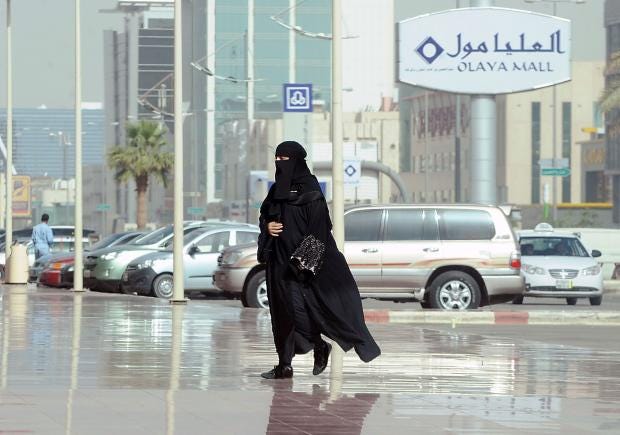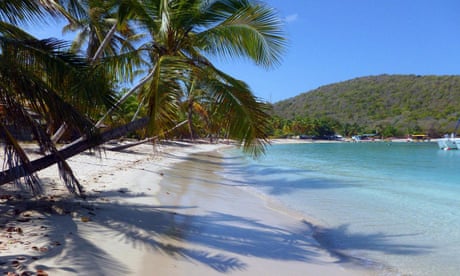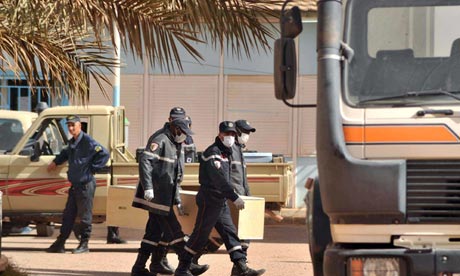Patrick Cockburn in The Independent

A shooper at the Olaya mall in the Saudi capital of Riyadh. Ordinary citizens may be hit by efforts to tackle global corruption and patronageGetty
Can corruption be controlled by reform or is it so much the essential fuel sustaining political elites that it will only be ended – if it ends at all – by revolutionary change?
The answer varies according to which countries one is talking about, but in many - particularly those relying on the sale of natural resources like oil or minerals - it is surely too late to expect any incremental change for the better. Anti-corruption drives are a show to impress the outside world or to target political rivals.
The anti-corruption summit in London this week may improve transparency and disclosure, but it can scarcely be very effective against politically well-connected racketeers, busily transmuting political power into great personal wealth.
This is peculiarly easy to do in those countries in the Middle East and Africa which suffer from what economists call “the resource curse”, where states draw their revenues directly from foreign buyers of their natural resources. The process is described in compelling detail by Tom Burgis in his book, The Looting Machine: Warlords, Tycoons, Smugglers and the Systematic Theft of Africa’s Wealth. He quotes the World Bank as saying that 68 per cent of people in Nigeria and 43 per cent in Angola, respectively the first and second largest oil and gas producers in Africa, live in extreme poverty, or on less than $1.25 a day. The politically powerful live parasitically off the state’s revenues and are not accountable to anybody.
Can corruption be controlled by reform or is it so much the essential fuel sustaining political elites that it will only be ended – if it ends at all – by revolutionary change?
The answer varies according to which countries one is talking about, but in many - particularly those relying on the sale of natural resources like oil or minerals - it is surely too late to expect any incremental change for the better. Anti-corruption drives are a show to impress the outside world or to target political rivals.
The anti-corruption summit in London this week may improve transparency and disclosure, but it can scarcely be very effective against politically well-connected racketeers, busily transmuting political power into great personal wealth.
This is peculiarly easy to do in those countries in the Middle East and Africa which suffer from what economists call “the resource curse”, where states draw their revenues directly from foreign buyers of their natural resources. The process is described in compelling detail by Tom Burgis in his book, The Looting Machine: Warlords, Tycoons, Smugglers and the Systematic Theft of Africa’s Wealth. He quotes the World Bank as saying that 68 per cent of people in Nigeria and 43 per cent in Angola, respectively the first and second largest oil and gas producers in Africa, live in extreme poverty, or on less than $1.25 a day. The politically powerful live parasitically off the state’s revenues and are not accountable to anybody.

READ MORE
This is the essay on corruption that Cameron didn't want you to read
Burgis explains the devastating outcome of a government acquiring such great wealth without doing more than license foreign companies to pump oil or excavate minerals. This “creates a pot of money at the disposal of those who control the state. At extreme levels the contract between rulers and the ruled breaks down because the ruling class does not need to tax the people – so it has no need for their consent.”
He writes primarily about Africa south of the Sahara, but his remarks apply equally to the oil states of the Middle East. He rightly concludes that “the resource industry is hardwired for corruption. Kleptocracy, or government by theft, thrives. Once in power, there is little incentive to depart.” Autocracy flourishes, often same ruler staying for decades.
Most, but not all, of this is true of the Middle East oil producers. A difference is that most of these have patronage and client systems through which oil wealth funds millions of jobs. This goes a certain way in distributing oil revenues among the general population, though the benefits are unfairly skewed towards political parties or dominant sectarian and ethnic groups.
In Iraq there are seven million state employees and pensioners out of a population of 33 million who are paid $4bn a month or a big chunk of total oil income. Often these employees don’t do much or, on occasion, anything at all, but it is an exaggeration to imagine that Iraq’s oil money is all syphoned off by the ruling elite.
I remember in one poor Shia province in south Iraq talking to local officials who said that they had just persuaded the central government to pay for another 50,000 jobs, though they admitted that they had no idea what these new employees would be doing.
Reformers frequently demand that patronage be cut back in the interests of efficiency, but a more likely outcome of such a change is that a smaller proportion of the population would benefit from the state income.

READ MORE
Saudi is about to attempt its own version of Mao's Great Leap Forward
This could be the result of Deputy Crown Prince Mohammed bin Salman’s radical plans to transform the way Saudi Arabia is run and end its reliance on oil by 2030. He may well find that the way Saudi society works has long gelled and face strong resistance to changing a system in which ordinary Saudis feel entitled to some sort of job and salary.
The “resource curse” is not readily reversible, because it eliminates other forms of economic activity. The price of everything produced in an oil state is too expensive to compete with the same goods made elsewhere so oil becomes the only export. Migrants pour in as local citizens avoid manual labour or employment with poor pay and conditions.
A further consequence of the curse is that the rulers of resource rich states – like many an individual living on an unearned income – get an excessive and unrealistic idea of their own abilities. Saddam Hussein was the worst example of such megalomania, starting two disastrous wars against Iran and Kuwait. But the Shah of Iran was not far behind the Iraqi leader in grandiose ideas, blithely ordering nuclear power stations and Concorde supersonic passenger aircraft.
Muammur Gaddafi insisted that Libyans study the puerile nostrums of the Green Book, and those failing that part of the public examinations about the book, were failed generally and had to re-take all their exams again.
Can “the looting machine” in the Middle East, Africa and beyond be dismantled or made less predatory?

READ MORE
Catholic leaders are undoing the good work of Pope Francis on migrants
Its gargantuan size and centrality to the interest of ruling classes probably makes its elimination impossible, though competition, transparency and more effective bureaucratic procedures in the award of contracts might have some effect. The biggest impulse to resistance locally to official corruption has come because the fall in the price of oil and other commodities since 2014 means that the revenue cake has become too small to satisfy all the previous beneficiaries.
The mechanics and dire consequences of this system are easily explained though often masked by neo-liberal rhetoric about free competition.
In authoritarian states without accountability or a fair legal system, this approach becomes a license to loot. Corruption cannot be tamed because it is at the very heart of the system.





